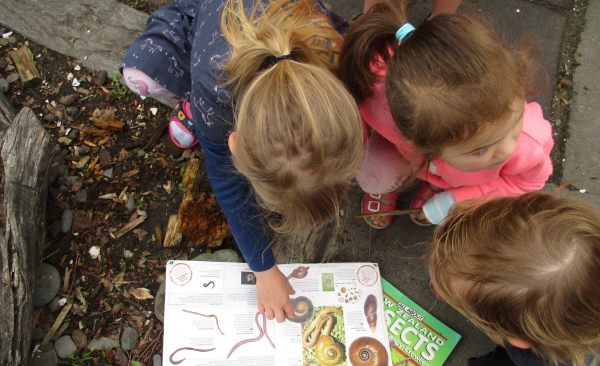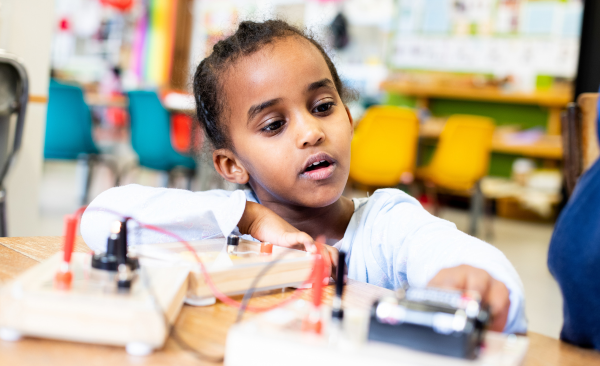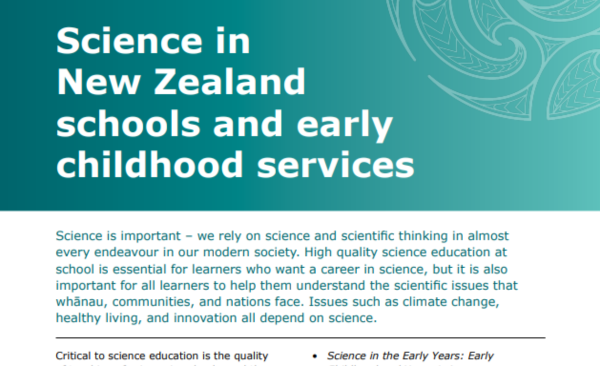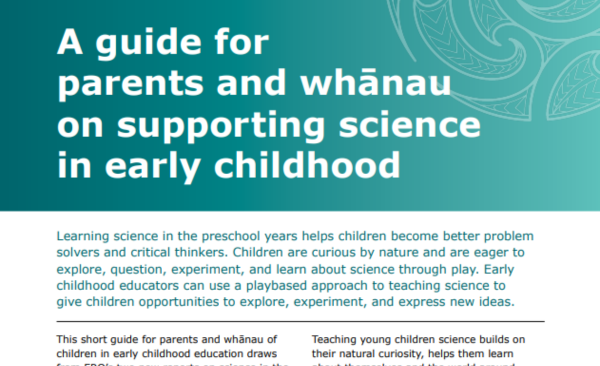Related insights
Explore related documents that you might be interested in.
Read Online
Introduction
We share our findings in detail in two new reports:
- Science in the early years: Early Childhood and Years 1-4
- Shining a Light on Science: Good Practice in Early Childhood Services.
This short guide for early childhood education leaders and kaiako draws from the full reports to help you:
- understand what makes a difference for science in early childhood education
- identify how you could strengthen science teaching and learning in your service.
We hope you find this guide useful to reflect on how science is currently integrated through your curriculum, and ideas for how to extend children’s learning in science.
We share our findings in detail in two new reports:
- Science in the early years: Early Childhood and Years 1-4
- Shining a Light on Science: Good Practice in Early Childhood Services.
This short guide for early childhood education leaders and kaiako draws from the full reports to help you:
- understand what makes a difference for science in early childhood education
- identify how you could strengthen science teaching and learning in your service.
We hope you find this guide useful to reflect on how science is currently integrated through your curriculum, and ideas for how to extend children’s learning in science.
Why science matters at this age
Science learning in early childhood supports children to become better problem solvers and critical thinkers. Children are curious by nature and are eager to explore, question, experiment, and learn about science through play. A play-based approach to teaching science builds on children’s motivation to learn and provides opportunities for them to explore ideas, experiment, and express new ideas.
Science learning in early childhood supports children to become better problem solvers and critical thinkers. Children are curious by nature and are eager to explore, question, experiment, and learn about science through play. A play-based approach to teaching science builds on children’s motivation to learn and provides opportunities for them to explore ideas, experiment, and express new ideas.
What we found impacts on science in early childhood education
Leaders are important in setting a clear direction
Having leaders with a focus on science enhances children’s opportunities for successful science learning. Science leaders can help strengthen science teaching and learning by:
- helping with resourcing decisions and developing curriculum materials
- supporting professional learning for others in the teaching team through sharing their knowledge and experience
- identifying professional learning and development opportunities relating to science and sharing these with kaiako and leaders
- making sure science is considered in internal evaluation so you know how effectively your service is promoting children’s learning in science.
To find out more about good practice in leadership of science see page five in our report Shining a Light on Science: Good Practice in Early Childhood Services.
Intentionally applying a scientific lens to learning opportunities is important
Successful science in early learning services gives children the opportunities to develop the knowledge, skills, dispositions, and working theories that serve as the foundation for ongoing learning in science and for developing scientific literacy. When you are intentional about applying a scientific lens you might:
- think about how the physical environment and resources you provide can stimulate children’s interest in science
- plan to include a variety of contexts for children to learn in science, including the Living World, Material World, Physical World, and Planet Earth and Beyond
- identify children’s science-related working theories and dispositions, and think about how to extend these
- plan to develop children’s science vocabulary, so they can explain their thinking.
If you want some examples of good practice in extending children’s science learning across a variety of contexts, see pages eight to 11, 14 and 17 to 18 of our report Shining a Light on Science: Good Practice in Early Childhood Services.
Science in the curriculum needs to be responsive to all learners’ interests, knowledge and needs
When planning responsive science learning opportunities for children, you could consider:
- what children already know and are interested in
- the future direction of their learning journey in science
- ways to reflect children’s languages and cultures in the science contexts and experiences you offer
- ways to include te ao Māori, such as Māori practices and values, or ngā pūrākau
- stories, places and experiences that are meaningful to children and their whānau.
It is important to consider if the opportunities you provide ensure equitable access to teaching and learning in science, particularly for priority learners.
If you want some examples of good practice in planning responsive science learning opportunities, see pages 12 to 14 of our report Shining a Light on Science: Good Practice in Early Childhood Services.
Leaders are important in setting a clear direction
Having leaders with a focus on science enhances children’s opportunities for successful science learning. Science leaders can help strengthen science teaching and learning by:
- helping with resourcing decisions and developing curriculum materials
- supporting professional learning for others in the teaching team through sharing their knowledge and experience
- identifying professional learning and development opportunities relating to science and sharing these with kaiako and leaders
- making sure science is considered in internal evaluation so you know how effectively your service is promoting children’s learning in science.
To find out more about good practice in leadership of science see page five in our report Shining a Light on Science: Good Practice in Early Childhood Services.
Intentionally applying a scientific lens to learning opportunities is important
Successful science in early learning services gives children the opportunities to develop the knowledge, skills, dispositions, and working theories that serve as the foundation for ongoing learning in science and for developing scientific literacy. When you are intentional about applying a scientific lens you might:
- think about how the physical environment and resources you provide can stimulate children’s interest in science
- plan to include a variety of contexts for children to learn in science, including the Living World, Material World, Physical World, and Planet Earth and Beyond
- identify children’s science-related working theories and dispositions, and think about how to extend these
- plan to develop children’s science vocabulary, so they can explain their thinking.
If you want some examples of good practice in extending children’s science learning across a variety of contexts, see pages eight to 11, 14 and 17 to 18 of our report Shining a Light on Science: Good Practice in Early Childhood Services.
Science in the curriculum needs to be responsive to all learners’ interests, knowledge and needs
When planning responsive science learning opportunities for children, you could consider:
- what children already know and are interested in
- the future direction of their learning journey in science
- ways to reflect children’s languages and cultures in the science contexts and experiences you offer
- ways to include te ao Māori, such as Māori practices and values, or ngā pūrākau
- stories, places and experiences that are meaningful to children and their whānau.
It is important to consider if the opportunities you provide ensure equitable access to teaching and learning in science, particularly for priority learners.
If you want some examples of good practice in planning responsive science learning opportunities, see pages 12 to 14 of our report Shining a Light on Science: Good Practice in Early Childhood Services.
How can you strengthen opportunities for children’s learning in science?
You might like to start by exploring the ideas below.
Leadership
- If you don’t have a science leader, think about who has strengths and interests that could help.
- Consider what kaiako know and understand about science and what professional learning and development (PLD) might be helpful.
- Think about how to use science leaders or people with an interest in science to provide internal PLD about science.
- Evaluate how well the opportunities you provide are supporting children’s learning in science.
Intentional teaching
- Plan ways to incorporate the language of science as part of the rich oral language environment you provide.
- Consider a variety of contexts for learning beyond the Living World.
- Pay attention to what children are learning in science and share that with their parents and whānau.
- Use what you know about children’s learning in science to plan opportunities to deepen children’s learning.
Responsive curriculum
- Consider children’s working theories and how to test, refine, and extend them.
- Plan how to authentically incorporate a bicultural lens in science learning opportunities.
- Consider how to ensure all learners, including priority learners, have opportunities to learn in science.
You might like to start by exploring the ideas below.
Leadership
- If you don’t have a science leader, think about who has strengths and interests that could help.
- Consider what kaiako know and understand about science and what professional learning and development (PLD) might be helpful.
- Think about how to use science leaders or people with an interest in science to provide internal PLD about science.
- Evaluate how well the opportunities you provide are supporting children’s learning in science.
Intentional teaching
- Plan ways to incorporate the language of science as part of the rich oral language environment you provide.
- Consider a variety of contexts for learning beyond the Living World.
- Pay attention to what children are learning in science and share that with their parents and whānau.
- Use what you know about children’s learning in science to plan opportunities to deepen children’s learning.
Responsive curriculum
- Consider children’s working theories and how to test, refine, and extend them.
- Plan how to authentically incorporate a bicultural lens in science learning opportunities.
- Consider how to ensure all learners, including priority learners, have opportunities to learn in science.
Where can you go to for more help?
Te Whāriki online is a Ministry of Education website that is designed to support kaiako as they work with tamariki. It includes a focus on science in the curriculum.
It’s a Bug’s Life science resource is developed by Te Papa in collaboration with several early childhood services. It is a practical resource that has activity ideas that could be used to informed science teaching.
Interactive science in a sociocultural environment in early childhood (PDF 874KB) provides a practical overview of science in early childhood education is provided it explores science learning areas and pedagogy.
We appreciate the work of all those who supported this evaluation, particularly the children, leaders, and teachers who shared with us about science teaching and learning in their service. Their experiences and insights are at the heart of what we have learnt. You can find the full reports on science in early childhood education services, along with a short summary of the findings, on ERO’s website www.ero.govt.nz.
Te Whāriki online is a Ministry of Education website that is designed to support kaiako as they work with tamariki. It includes a focus on science in the curriculum.
It’s a Bug’s Life science resource is developed by Te Papa in collaboration with several early childhood services. It is a practical resource that has activity ideas that could be used to informed science teaching.
Interactive science in a sociocultural environment in early childhood (PDF 874KB) provides a practical overview of science in early childhood education is provided it explores science learning areas and pedagogy.
We appreciate the work of all those who supported this evaluation, particularly the children, leaders, and teachers who shared with us about science teaching and learning in their service. Their experiences and insights are at the heart of what we have learnt. You can find the full reports on science in early childhood education services, along with a short summary of the findings, on ERO’s website www.ero.govt.nz.
Publication Information and Copyright
A guide for kaiako and leaders on supporting science in early childhood
Published April 2021
Except for the Education Review Office’s logo used throughout this report, this copyright work is licensed under Creative Commons Attribution 3.0 New Zealand licence. In essence, you are free to copy, distribute and adapt the work, as long as you attribute the work to the Education Review Office and abide by the other licence terms. In your attribution, use the wording ‘Education Review Office’, not the Education Review Office logo or the New Zealand Government logo.
A guide for kaiako and leaders on supporting science in early childhood
Published April 2021
Except for the Education Review Office’s logo used throughout this report, this copyright work is licensed under Creative Commons Attribution 3.0 New Zealand licence. In essence, you are free to copy, distribute and adapt the work, as long as you attribute the work to the Education Review Office and abide by the other licence terms. In your attribution, use the wording ‘Education Review Office’, not the Education Review Office logo or the New Zealand Government logo.




